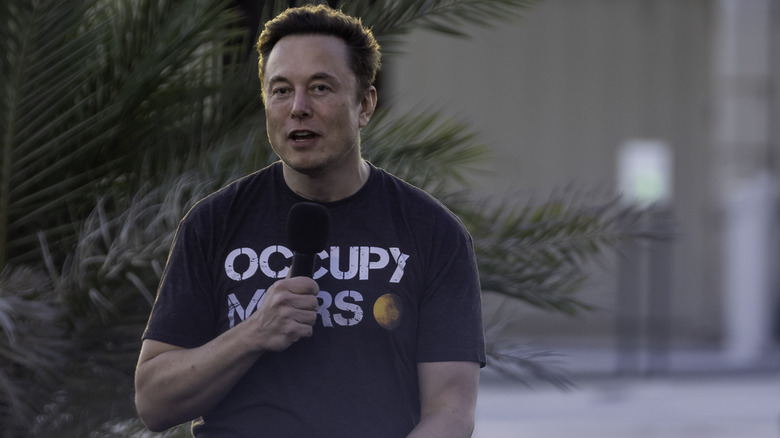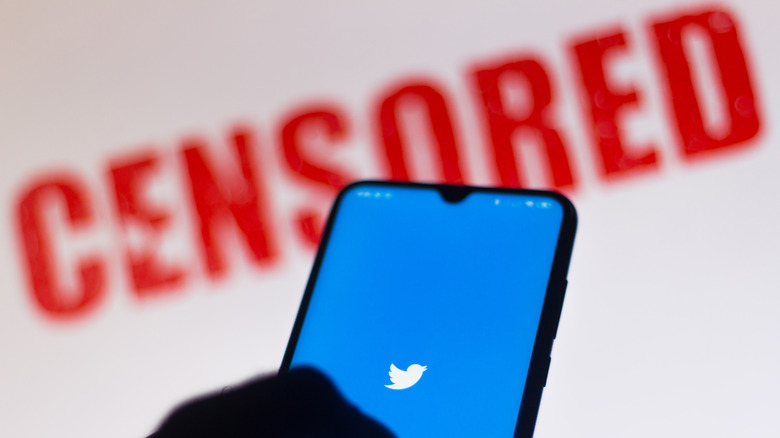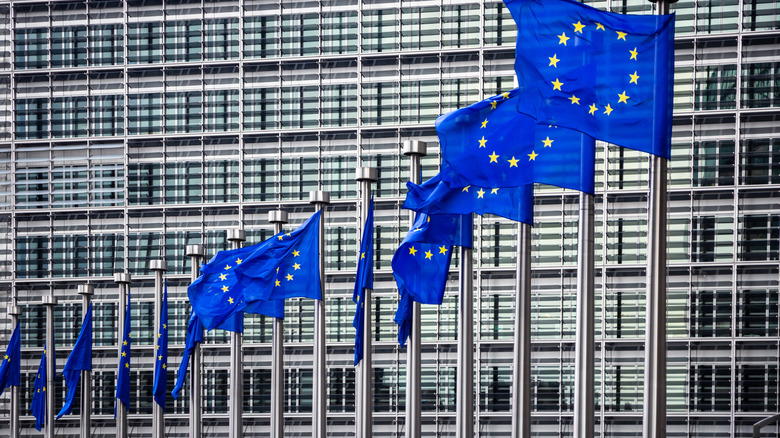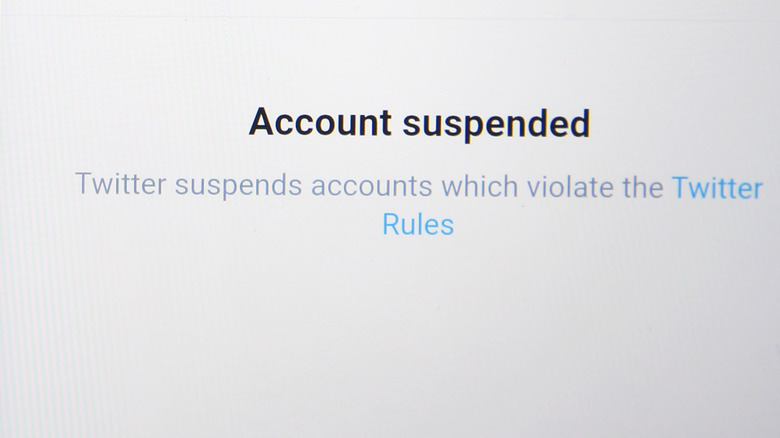Elon Musk May Own Twitter But He Still Has To Play By EU Rules
Elon Musk's Twitter purchase is finally complete. The world's richest man wasted no time putting his stamp on the company, almost immediately firing several board members. While outgoing Twitter staff may not be spending their severance pay on a Tesla any time soon, the general public's reaction to the takeover has been more mixed. Most of the arguments revolve around Musk's plans to turn Twitter into what he calls a "free speech platform." While many have welcomed the idea, others have threatened to abandon the platform entirely. That may not put Musk off, but there are other reasons he may not be able to do what he wants with the company he's just spent $44 billion on.
the bird is freed
— Elon Musk (@elonmusk) October 28, 2022
Legislation and the politicians that implement it may be a stumbling block for Musk's plans. To use an example that people who aren't multi-billionaires can relate to, you can buy a car, and in doing so you will own that car, but if you don't play by the rules you can't take that car on a public road. Just as driving along a highway with three flat tires and no exhaust will more than likely result in a hefty fine, so too will allowing certain things to be published through a company you've just bought for more than Latvia's annual GDP.
Musk's free speech plans are at the center of the controversy
The mixed reactions to Musk's takeover may not come as a surprise. Since early on in the saga, the self-described "free speech absolutist" has openly discussed toning down Twitter's terms of standards. As for exactly where the line is, Musk has repeatedly stated he sees national laws as a good indicator of what speech should and should not be allowed. Back in April, Twitter's new owner tweeted "I am against censorship that goes far beyond the law. If people want less free speech, they will ask the government to pass laws to that effect."
By “free speechâ€, I simply mean that which matches the law.
I am against censorship that goes far beyond the law.
If people want less free speech, they will ask government to pass laws to that effect.
Therefore, going beyond the law is contrary to the will of the people.
— Elon Musk (@elonmusk) April 26, 2022
Most of the controversy isn't centered on opposition to the concept of free speech itself but seems to be based on a fear of "misinformation." Several users threatening to leave the platform worry a relaxation of the rules will lead to it becoming a hotbed of conspiracy theories, racism, and unchecked political extremism.
As the takeover was drawing to a close, Musk himself seemed to suggest there would be some reasonable restrictions on what could be said on Twitter. In an open letter to advertisers in which he explained why he's buying Twitter, Musk reaffirmed his beliefs that Twitter should be a space where a range of ideas could be discussed, but also said that the platform "cannot become a free-for-all hellscape, where anything can be said with no consequences!"
Could other countries force Musk to censor Twitter?
While it could be assumed Musk is referring to the laws of the United States when talking about speech restrictions — Twitter is an international company and laws vary from place to place. While the U.S. authorities have very limited scope to prosecute someone for what they say, other countries where Twitter operates can impose a death sentence for things like blasphemy. One group of nations that is likely to force some form of action is the European Union — a political collection of 27 European countries. Responding to Musk's "the bird is freed" Tweet, Thierry Breton, the Commissioner for Internal Market of the European Union, said, "In Europe, the bird will fly by our rules" before referencing DSA. The DSA, or Digital Services Act, is a package of laws designed to regulate tech companies, online platforms, and the internet. It was introduced over the summer and will take effect in 2024.
In Europe, the bird will fly by our 🇪🇺 rules.#DSA https://t.co/95W3qzYsal
— Thierry Breton (@ThierryBreton) October 28, 2022
While a lot of the legislation is commerce related, one section relates to "Online services" that are being "misused by manipulative algorithmic systems to amplify the spread of disinformation, and for other harmful purposes." Violating the DSA could result in a fine or the company being banned from operating in the European Union.
So what can Musk do?
Musk has a number of options. He could simply stop Twitter from operating in the E.U. — though that's unlikely as the bloc's combined GDP makes it the world's third-largest economy behind China and the United States. Equally, he could refuse to comply or pay any fines and force the E.U. to take action. It wouldn't be unprecedented. Several Western social media companies, including Twitter, are banned from China due to the Chinese Communist Party's strict censorship policies. He could also comply with the particular legislation the E.U. is implementing and incorporate it into Twitter's rules. Given Musk has repeatedly stated he thinks free speech should fall in line with laws that have been implemented, this is likely to happen in some form. The billionaire is also on video agreeing with the DSA's implementation and what it means for platform regulation.
Today @elonmusk and I wanted to share a quick message with you on platform regulation 🇪🇺#DSA pic.twitter.com/nvP5FEXECY
— Thierry Breton (@ThierryBreton) May 9, 2022
There is also another option, that requires some effort but is more than achievable. By restricting certain tweets based on IP range, Twitter could block viewers from certain countries from seeing certain content. Anyone who has attempted to view a sports clip online, only to be told it isn't available in your area, will be familiar with the concept. Although deciding what triggers the restrictions will be difficult, this is probably the most obvious way Musk can balance "free speech" with the web of national laws his new platform has to answer to.



